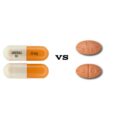Adderall is a prescription medication that contains two active ingredients, amphetamine, and dextroamphetamine. These ingredients work by increasing the levels of certain neurotransmitters, such as dopamine and norepinephrine, in the brain.
Adderall is primarily used to treat attention deficit hyperactivity disorder (ADHD) and narcolepsy. ADHD is a condition that affects both children and adults and is characterized by symptoms such as hyperactivity, impulsivity, and inattention. Narcolepsy is a sleep disorder that causes excessive daytime sleepiness and sudden episodes of falling asleep.
The history of Adderall dates back to the 1930s when amphetamines were first synthesized. In the 1960s, the use of amphetamines became widespread as a treatment for ADHD. In the 1990s, Shire Pharmaceuticals developed Adderall as a combination of amphetamine and dextroamphetamine, which was approved by the US Food and Drug Administration (FDA) in 1996. Since then, Adderall has become one of the most commonly prescribed medications for ADHD.
However, due to its properties, Adderall can also be abused as a recreational drug. The misuse and abuse of Adderall have become a growing concern, particularly among college students who use it as a study aid or to enhance performance. In addition, there is growing confusion as to whether Adderall is considered a narcotic or not. In this article, we will explore what a narcotic is, the classification of Adderall, and the potential risks and benefits of using Adderall.
What is a Narcotic?
The term “narcotic” is often used interchangeably with the term “opioid,” but they are not the same thing. Opioids are a class of drugs that include both prescription painkillers like oxycodone, hydrocodone, and morphine, as well as illegal drugs like heroin. These drugs work by binding to opioid receptors in the brain and spinal cord, which can help reduce pain but also produce feelings of euphoria and relaxation.
On the other hand, the term “narcotic” has a broader definition that includes any drug or substance that produces a sedative effect or dulls the senses. This can include drugs like benzodiazepines, barbiturates, and alcohol, as well as opioids. In general, narcotics are drugs that have a high potential for abuse and dependence and are often classified as controlled substances by the government.
Is Adderall a Narcotic?
No, Adderall is not a narcotic, nor is it an opioid. It is a stimulant medication that contains a combination of amphetamine and dextroamphetamine. These chemicals work by increasing the activity of certain neurotransmitters in the brain, including dopamine and norepinephrine, which can help improve focus, attention, and alertness.
Adderall is classified as a Schedule II controlled substance by the U.S. Drug Enforcement Administration (DEA), which means that it has a high potential for abuse and dependence. Other drugs in this category include opioids like oxycodone and fentanyl, as well as stimulants like cocaine and methamphetamine.
While Adderall is not a narcotic, it is still a powerful medication that should only be used under the guidance of a healthcare professional. It is important to take Adderall exactly as prescribed, and not to share it with others or use it recreationally.
Potential Risks and Benefits of Adderall Use
Like all medications, Adderall comes with potential risks and benefits. Some potential benefits of Adderall use include:
- Improved focus and attention: Adderall can help people with ADHD stay focused and attentive, which can improve their ability to complete tasks and engage in daily activities.
- Increased energy and alertness: Adderall can help combat feelings of fatigue and drowsiness, making it easier for people with narcolepsy to stay awake during the day.
- Enhanced academic or athletic performance: Some people use Adderall as a performance-enhancing drug to improve their academic or athletic performance.
However, there are also potential risks associated with Adderall use. These can include:
- Dependence and addiction: Adderall has a high potential for abuse and dependence, and can be habit-forming if used improperly. Long-term use can lead to physical dependence and withdrawal symptoms if use is stopped abruptly.
- Side effects: Adderall can cause a range of side effects, including insomnia, loss of appetite, headaches, and stomach upset. In rare cases, it can also cause more serious side effects like seizures, heart problems, and psychosis.
- Misuse: Adderall is often misused or abused by people who do not have ADHD or narcolepsy, either for recreational purposes or to enhance academic or athletic performance. Misuse of Adderall can lead to serious health consequences, including addiction, overdose, and other negative effects on physical and mental health.
It is important for people who are prescribed Adderall to always take the medication as directed and to inform their healthcare provider of any side effects or concerns. People who misuse Adderall should seek help from a healthcare provider or addiction specialist to manage their addiction and minimize potential harm.
Conclusion
In conclusion, Adderall is not a narcotic or an opioid. It is a stimulant medication used to treat ADHD and narcolepsy and is classified as a Schedule II controlled substance due to its high potential for abuse and dependence. While Adderall can provide benefits for people with these conditions, it is important to use the medication only as directed by a healthcare professional and to be aware of potential risks and side effects. Misuse of Adderall can lead to serious health consequences, including addiction and overdose, and should be avoided. If you have any questions or concerns about Adderall use, speak to your healthcare provider or a mental health professional.





